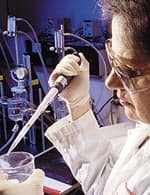Life Extension Magazine®
While many anti-aging enthusiasts are familiar with the hormone DHEA (dehydroepiandrosterone), far fewer are likely to be aware of its metabolite, 7-Keto DHEA, which is responsible for many of DHEA’s beneficial actions. Scientists have documented DHEA’s wide-ranging benefits in numerous clinical studies. DHEA helps to retard the effects of aging and promotes enhanced longevity, exerting a multitude of effects through its conversion to some 150 metabolites, each with unique actions within the body. One of the most important of these is 7-Keto DHEA (commonly referred to as 7-Keto), a hormone metabolite that can safely boost immune function and help reduce body fat. Unlike DHEA, however, 7-Keto does not convert to estrogen and testosterone. Because DHEA and 7-Keto have separate and unique functions and properties, it is important to understand the differences between these two popular dietary supplements. Fast-Acting and SafeThe term 7-Keto is in fact a brand name for the chemical compound 3-acetyl-7-oxo-dehydroepiandros-terone, a naturally occurring metabolite primarily produced in the adrenal glands and skin (though some production occurs in the brain as well). It was first discovered in 1958, when it was found in urine.1 As shown in Figure 1, human blood levels of 7-Keto tend to follow the same course over time as those of DHEA, rising until about the age of 20 and then slowly descending beginning around the age of 30. Urinary excretion studies show that average blood concentrations of 7-Keto decline nearly 50% by age 50.2 “This reduction in 7-Keto levels is partially responsible for the increases in body fat and total body weight often seen in older people,” notes Dr. Sergey Dzugan, president of Life Extension Scientific Information, Inc. “This decline also plays a role in the compromised immune function that is a hallmark of the aging process. Moreover, since DHEA and 7-Keto decline at a more rapid rate than cortisol, this creates a period of cortisol dominance that can wreak havoc on the immune system. For these reasons, supplementation with 7-Keto is often appropriate.”
Studies have demonstrated that 7-Keto does not accumulate in the body over time and is free of unhealthy side effects. An analysis of the metabolite at the Chicago Center for Clinical Research found that 7-Keto is rapidly absorbed and sulfated, much like DHEA.3 The sulfated form of 7-Keto DHEA is more stable in plasma, and blood levels can therefore be more accurately measured with laboratory equipment. In the Chicago analysis, peak plasma levels were achieved 2.2 hours after supplementation, and a steady-state level in plasma was reached with twice-daily dosing. Despite 7-Keto DHEA’s rapid elimination by the body, measured as a half-life of 2.17 hours, relatively high blood levels are quickly achieved. For example, after one week of dosing at 200 mg per day, a mean 7-Keto level of 15.8 nanograms per milliliter (ng/ml) was attained; after four weeks of supplementation, the mean level was only modestly higher at 16.3 ng/ml. Supplementation with 7-Keto can therefore have relatively rapid benefits. Lower dosing resulted in proportionally lower blood levels of 7-Keto.3 Toxicology studies have revealed that this level of supplementation is very safe.4 A “LD50” study in rats (used to determine the dose at which 50% of the test subjects would have died) found that the toxic dosage of 7-Keto would have to exceed 2 grams per kilogram of body weight—the equivalent of a daily dose of 160 grams (not milligrams) for the average 176-pound person, or more than a third of a pound of 7-Keto per day! Laboratory analysis of 7-Keto showed that it does not cause DNA mutations, and an escalating dose study of oral supplementation in rhesus monkeys showed no adverse clinical effects at doses as high as 500 mg/kg of body weight, or the equivalent of 40,000 mg daily for the average human.5 Another benefit to 7-Keto is that it does not convert to estrogen or testosterone.6 This makes 7-Keto a safe alternative for persons with hormone-sensitive cancers, for whom regular DHEA may be too risky.” Immune-Boosting PropertiesAging is associated with a decline in immune system response, with often-dramatic reductions in immune function. This leads to increased susceptibility to infections. For example, people with age-related declines in cellular immunity have an impaired response to influenza vaccine, making them more susceptible to catching the flu, even if they have received a flu shot. A study at the Minnesota Applied Research Center and the Geriatric Research Education and Clinical Center in Minneapolis found that four weeks of 7-Keto supplementation improved immune function in elderly men and women.7 In this randomized, double-blind, placebo-controlled study, 22 women and 20 men over the age of 65 took 100 mg of 7-Keto twice daily or a placebo of identical shape and size. Patients in the 7-Keto group had a significant decrease in immune suppressor cells and a significant increase in immune helper cells. The 7-Keto group also saw reductions in diastolic blood pressure and an increase in neutrophils, the first white blood cells to respond to infection. The scientists concluded that 7-Keto was well tolerated and had no serious adverse effects. A Czech research team discovered that 7-Keto can counteract the effect of circulating glucocorticoids, such as cortisol, which often rise with age and can suppress immune function.8 This study was performed in vitro on the spleen lymphocytes of mice, which were exposed to an immune-suppressing drug. Without 7-Keto, the drug produced dramatic reductions in spleen lymphocyte levels. However, when 7-Keto was added, cell viability more than doubled and a measure of primary immune response rose by 150%. A study at the Chinese Academy of Medical Sciences in Beijing confirms the immune-boosting properties of 7-Keto.9 Scientists exposed mice with compromised immune systems to chronic mild stress for four weeks. The traumatic regimen decreased their white blood cell proliferative response and produced other abnormalities in immune function. Additionally, levels of thyroid hormones decreased. However, when the mice were given 7-Keto at a dose of 15 mg/kg of body weight, their blood cell prolifera-tive response and natural killer cell activity were dramatically enhanced. The levels of thyroid hormone also returned to normal. The Primary Thermogenic Hormone7-Keto produces fat loss through the process of thermogenesis. This term refers to the creation of heat, which is one of the forms of energy produced when the body’s cells metabolize the food we eat. Greater amounts of thermogenesis boost the body’s metabolic rate which increases the conversion of stored fat into energy. 7-Keto enhances the activity of three thermogenic enzymes that stimulate fatty acid oxidation in the liver. These thermogenic-en-hancing enzymes are fatty acyl CoA oxidase, malic enzyme, and glycerol-3-phosphate dehydrogenase.6,10-12 These enzymes drive the liver cells to burn fatty acids for energy, which causes a lowering of triglycerides in the liver. Supplementation with 7-Keto has a dramatic effect on boosting levels of these thermogenic-enhancing enzymes. Studies found that fatty acyl CoA oxidase increased by 128%, while malic enzyme jumped 860%. The concentration of glycerol-3-phosphate dehydrogenase increased by 138% as well.6,10-12 A study published in Current Therapeutic Research revealed just how effective 7-Keto is in inducing fat loss.13 In this randomized, double-blind, placebo-controlled study, 30 overweight adults (28 women and 2 men) were divided into two groups. Group 1 received 100 mg of 7-Keto twice daily for eight weeks, while group 2 took a matching pla-cebo capsule. All subjects participated in an exercise program three times a week that consisted of 50 minutes of aerobic and non-aerobic cross training under the supervision of an exercise physiologist. In addition, each subject was instructed by a registered dietitian to follow an 1800-calorie-a-day diet. The subjects underwent testing for blood chemistry, body composition, blood pressure, and dietary analysis at baseline and at weeks four and eight. The researchers found that the 7-Keto group lost a significant amount of body weight compared to the placebo group—6.3 versus 2.1 pounds. The 7-Keto group also lost a greater percentage of body fat compared to the placebo group—1.8% versus 0.57%.13 Compared to the placebo group, the 7-Keto group saw a significant increase in thyroid hormone activity that targets fat- burning genes in the mitochondria and adipose tissue.14 No adverse effects were reported. The results show that 7-Keto can significantly and safely reduce body weight and body fat when combined with exercise and a reduced-calorie diet. This is due to the greatly increased levels of fat-burning enzymes in the liver as well as the elevation of thyroid hormone. These beneficial changes are known to boost basal metabolic rate, making it easier to shed excess pounds. Supplementation with 7-Keto can therefore help reverse the decline in metabolic rate that makes it so easy to put on weight as we age. Unlike caffeine and ephedrine, 7-Keto does not have a central nervous system stimulating effect caused by nor-adrenalin release, nor does 7-Keto increase heart rate or blood pressure. | |||
Cholesterol Reduction and Other BenefitsScientists have known for some time that DHEA supplementation can decrease blood cholesterol levels.15 The question then became which DHEA metabolite or metabolites are responsible for this action. A study at the Institute of Endocrinology in Prague, Czech Republic, revealed that 7-Keto contributes to this cholesterol-lowering activity.16 Ten volunteers aged 27 to 72 years applied a gel containing 25 mg of 7-Keto to their abdominal skin for five consecutive days. While the subjects’ reduction in total cholesterol was of only borderline significance, very beneficial changes occurred in cholesterol composition. Beneficial HDL (high-density lipoprotein) rose significantly, even though harmful LDL (low-density lipoprotein) was only slightly diminished. These changes produced a strong improvement in the atherogenic index, which measures the risk of cardiovascular disease. A significant rise in beneficial apolipo-protein A-1, a protector of cardiovascular health, also occurred. These findings indicate that 7-Keto has cholesterol-lowering effects at a dosage that is even lower than that required to achieve the same effects with DHEA.16 A study with mice suggests that 7-Keto can boost memory as well.17 In this experiment, researchers at the University of Wisconsin in Madison trained young mice in the use of a water maze. They found that a single injection of 7-Keto (at 24 mg/kg of body weight) reversed experimentally induced memory loss. The scientists then fed 7-Keto or DHEA to old mice that had learned the maze. They discovered that memory of the water-maze training was retained during a four-week test period in the mice receiving 7-Keto but not in those treated with DHEA.17 7-Keto may also provide benefits for people with Raynaud’s syndrome, a condition marked by cold, painful fingers and toes. Medical researchers believe that Raynaud’s represents an abnormal response to cold by blood vessels. A paper published in Medical Hypotheses suggests that 7-Ketomay be helpful in preventing primary Raynaud’s attacks by increasing the basal metabolic rate.18 Given what is known know about 7-Keto’s ability to boost levels of thyroid hormone T3, this hypothesis seems reasonable. Further studyis warranted.
Combination DHEA and 7-Keto TherapyBecause of the overwhelming scientific literature supporting the benefits of DHEA supplementation in older people, Life Extension has advocated DHEA replacement therapy since 1981. While this has been a dramatic step forward for many people, the newest research shows that additional benefits can be obtained through a combination of DHEA and 7-Keto therapy. “Co-supplementation with these hormones can be a very important part of hormone-restorative therapy,” explains Dr. Dzugan. “There are times when the use of regular DHEA can boost estrogen and testosterone concentrations to appropriate levels but still not be enough to put DHEA in the optimal range. Supplementation with 7-Keto can permit additional progress in optimizing immune function, cholesterol reduction, weight loss, and memory enhancement without raising these ‘downstream’ hormones, estrogen and testosterone, to an inappropriate degree. “Also, women sometimes experience hair loss or growth in facial hair when they take large amounts of DHEA due to its conversion to testosterone. The use of 7-Keto and a smaller, more suitable intake of DHEA can eliminate this problem while still giving them many of DHEA’s benefits, which in reality are due to its 7-Keto metabolite. Moreover, DHEA supplementation is contraindicated for hormone-sensitive cancers such as prostate cancer and many breast cancers. In these instances, dosing with 7-Keto is a viable alternative.” As shown earlier in Figure 1, average blood levels of 7-Keto decline with age. This reduction is responsible for some of the negative changes that occur during our mature years. As a result, 7-Keto supplementation becomes increasingly important with age. The best time to take 7-Keto is in the morning, when the body’s natural production peaks. This ensures that more plentiful levels of this hormone will be available consistent with the body’s natural cycle. People should avoid taking 7-Keto in the evening, as high blood levels at bedtime could stimulate brain activity and cause insomnia. Those who take more than one capsule daily should consume all of them around breakfast time. Because 7-Keto is a natural hormone metabolite and is easily assimilated, it can be taken with a meal or on an empty stomach. Consistent daily dosing is important to ensure a stable level of 7-Keto in the bloodstream. With all of the newly recognized benefits of 7-Keto, this workhorse metabolite is sure to become a standard part of hormone replacement therapy in the future. By offering many of the advantages of DHEA supplementation without conversion to estrogen and testosterone, 7-Keto affords older adults the opportunity to further promote their health and longevity even when their levels of the so-called “downstream” hormones are already optimal. Moreover, considering 7-Keto’s demonstrated ability to improve body composition, it is highly likely that this DHEA metabolite will become a staple supplement for many aging adults. After all, how many among us could not afford to lose a few pounds around the middle? | ||
| References | ||
1. Gallagher TF. Adrenocortical carcinoma in man; the effect of amphenone on individual ketosteroids. J Clin Endocrinol Metab. 1958 Sep;18(9):937-49. 2. Marenich LP. Excretion of testosterone, epitestosterone, androstenedione and 7-ketodehydroepiandrostenedione in healthy men of different ages. Probl Endokrinol (Mosk). 1979 Jul;25(4):28-31. 3. Davidson M, Marwah A, Sawchuk RJ, et al. Safety and pharmacokinetic study with escalating doses of 3-acetyl-7-oxo-dehydroepiandrosterone in healthy male volunteers. Clin Invest Med. 2000 Oct;23(5):300-10. 4. Lardy H, Henwood SM, Weeks CE. An acute oral gavage study of 3beta-acetoxyandrost-5-ene-7,17-dione (7-oxo-DHEA-acetate) in rats. Biochem Biophys Res Commun. 1999 Jan 8;254(1):120-3. 5. Henwood SM, Weeks CE, Lardy H. An escalating dose oral gavage study of 3beta-acetoxyandrost-5-ene-7, 17-dione (7-oxo-DHEA-acetate) in rhesus monkeys. Biochem Biophys Res Commun. 1999 Jan 8;254(1):124-6. 6. Lardy H, Partridge B, Kneer N, Wei Y. Ergosteroids: induction of thermogenic enzymes in liver of rats treated with steroids derived from dehydroepiandrosterone. Proc Natl Acad Sci USA. 1995 Jul 3;92(14):6617-9. 7. Zenk JL, Kuskowski MA. The use of 3-acetyl-7-oxo-dehydroepiandrosterone for augmenting immune response in the elderly. Presented at meeting of FASEB, April 17, 2004. 8. Hampl R, Lapcik O, Hill M, et al. 7-Hydroxydehydroepiandrosterone—a natural antiglucocorticoid and a candidate for steroid replacement therapy? Physiol Res. 2000;49 Suppl 1S107-12. 9. Liu YY, Yang N, Kong LN, Zuo PP. Effects of 7-oxo-DHEA treatment on the immunoreactivity of BALB/c mice subjected to chronic mild stress. Yao Xue Xue Bao. 2003 Dec;38(12):881-4. 10. Lardy H, Kneer N, Wei Y, Patridge B, Marwah P. Ergosteroids. II: Biologically active metabolites and synthetic derivatives of dehydroepiandrosterone. Steroids. 1998 Mar;63(3):158-65. 11. Bobyleva V, Kneer N, Bellei M, Battelli D, Lardy HA. Concerning the mechanism of increased thermogenesis in rats treated with dehydroepiandrosterone. J Bioenerg Biomembr. 1993 Jun;25(3):313.21. 12. Bobyleva V, Bellei M, Kneer N, Lardy H. The effects of the ergosteroid 7-oxo-dehydroepiandrosterone on mitochondrial membrane potential: possible relationship to thermogenesis. Arch Biochem Biophys. 1997 May 1;341(1):122-8. 13. Kalman DS, Colker CM, Swain MA, Torina GC, Shi Q. A randomized, double-blind, placebo-controlled study of 3-acetyl-7-oxo-dehydroepiandrosterone in healthy overweight adults. Curr Therap Res. 2000;61(7):435-42. 14. Karakoc A, Ayvaz G, Taneri F, et al. The effects of hypothyroidism in rats on serum leptin concentrations and leptin mRNA levels in adipose tissue and relationship with body fat composition. Encocr Res. 2004 May;30(2):247-55. 15. Nestler JE, Barlascini CO, Clore JN, Blackard WG. Dehydroepiandrosterone reduces serum low density lipoprotein levels and body fat but does not alter insulin sensitivity in normal men. J Clin Endocrinol Metab. 1988 Jan;66(1):57-61. 16. Sulcova J, Hill M, Masek Z, et al. Effects of transdermal application of 7-oxo-DHEA on the levels of steroid hormones, gonadotropins and lipids in healthy men. Physiol Res. 2001;50(1):9-18. 17. Shi J, Schulze S, Lardy HA. The effect of 7-oxo-DHEA acetate on memory in young and old C57BL/6 mice. Steroids. 2000 Mar;65(3):124-9. 18. Ihler G, Chami-Stemmann H. 7-oxo-DHEA and Raynaud’s phenomenon. Med Hypotheses. 2003 Mar;60(3):391-7. |




